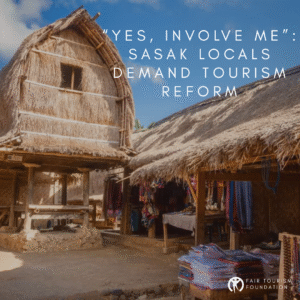Authored: Iiris Hämäläinen and Inemesit Ukpanah
MANDALIKA, INDONESIA – In the rolling hills of Mandalika, beyond the luxury resorts and surf-friendly beaches, a quieter voice is rising, which has long been overlooked in the conversation. It comes from the Sasak people, the Indigenous custodians of the land, who are not seeking to be on the receiving end of charity but wish to sit at the table of the tourism industry.
Domestic development programs run by the government have transformed the Mandalika region of Lombok into a special economic zone. These are driven by the promise of economic transition power through tourism. Roads were paved, resorts were built, and beachfronts were newly discovered. Yet, for several residents of Ebunud, Silak Hill, Petiwong, and Dondon, the promise of growth came hand in hand with the burden of exclusive access.
“I have no extended value in life after the development,” one local citizen told us during a recent community research project. His words echo a common sentiment, and a surprising message was a clarion call: growth has been delivered, but the opportunity has flown.
The designation of Mandalika as a Special Economic Zone has accelerated development by offering tax breaks and infrastructure incentives to major investors. It has also led to forced relocations and restricted access to ancestral lands for Sasak communities.
A Region Transform, But by Whom?
Tourism has arrived in Mandalika, changing the landscapes and livelihoods of entire communities. Traditional access to natural resources has been diminished. People’s homes have been displaced. The livelihoods of people who rely on subsistence fishing, weaving, and tilling have been disrupted by so-called “development” projects serving foreign investors, rather than local people.
In this context, Mandalika is becoming increasingly a hotspot for international tourists. Many Sasak families are left out, struggling in precarious conditions, looking from the sidelines as foreigners profit from their land and cultural heritage.
A recent participatory needs assessment involving more than 50 residents from four villages revealed that over 80% of community members. Therefore, they are at least interested in participating directly in tourism, not just as employees, but also as cultural ambassadors, small business operators, and guides.
Culture, Resilience, and a Desire to Participate
And yet, despite this disillusionment, hope remains. And a powerful clarion call for action is being made.
“Yes, involve me,” one community member said. “I want to share our weaving, pandan carpets, and coffee. Let me be part of it.”
From food-making to seafood grilling, weaving to language and storytelling, fishing to pandan carpet creation, and more ancestral crafts, the island’s residents are eager to get involved.
From demonstrating traditional fishing techniques to teaching the weaving of “kain tenun” or preparing local herbal drinks like jamue. The Sasak villagers are eager to offer rich, hands-on experiences that enable tourists to engage with their living heritage. Seasonal festivals, such as the Bau Nyale sea worm ritual, provide profound insights into the spiritual and ecological rhythms of the island.
However, as passive onlookers, hosts and knowledge guardians are eager to share their culture and traditions with conscious travellers. Their imagination is a tourism model that touches destinations and elevates them. It not only observes culture but also safeguards it.
Why Inclusive Tourism Matters Now
The motivations are clear: a desire for stable income, meaningful work, and dignity. But beyond economics lies something more profound: the right to shape how their identity is presented to the world.
Sasak’s voices expressed a meaningful concern for the implications of mass tourism. “We don’t want Lombok to be like Bali” was a frequent refrain among the interviewees, reflecting their concern about overtourism, erosion of culture, and increased cost of living.
“We’re not against tourism,” shared another resident. “We just want to be part of it, not pushed aside by it.”
Instead, they envision a more sustainable path rooted in community-based tourism. A model where locals co-create experiences, lead cultural tours, teach traditional skills, and benefit directly from tourism revenue.
The Role of Travellers in Shaping a Fairer Future
Travellers have a powerful choice: to support tourism models that include, not exclude.
Visitors to Lombok and Mandalika can choose experiences built on local leadership and cultural integrity. To help ensure that tourism’s benefits are shared more fairly, rather than allowing the people who create what’s unique about a place to be pushed aside in the name of progress.
As visitor numbers continue to rise in Mandalika, so must our responsibility to travel with care. Sustainable travel in Indonesia must centre communities like the Sasak, not as background scenery, but as the authors of their own story.
For us, the Fair Tourism Foundation work alongside communities to provide training, build capacity, and support local-led tourism initiatives. Investing in grassroots solutions can help ensure that tourism becomes a driver of empowerment, not displacement.
Travelling to Mandalika?
Here’s how you can support community-based tourism:
- Seek out tours and experiences led by local guides.
- Buy directly from artisans and family-owned businesses.
- Ask how your spending contributes to the local economy.
- Select accommodations that are committed to ethical and inclusive practices.


This Post Has 0 Comments